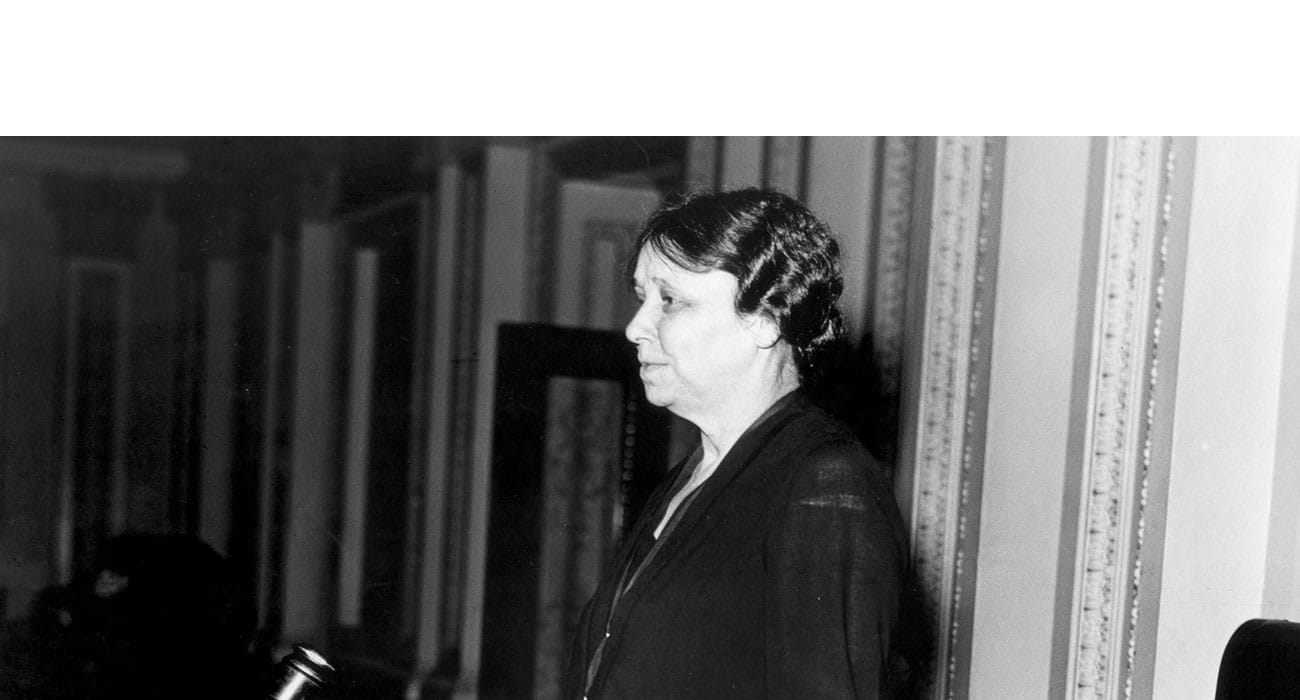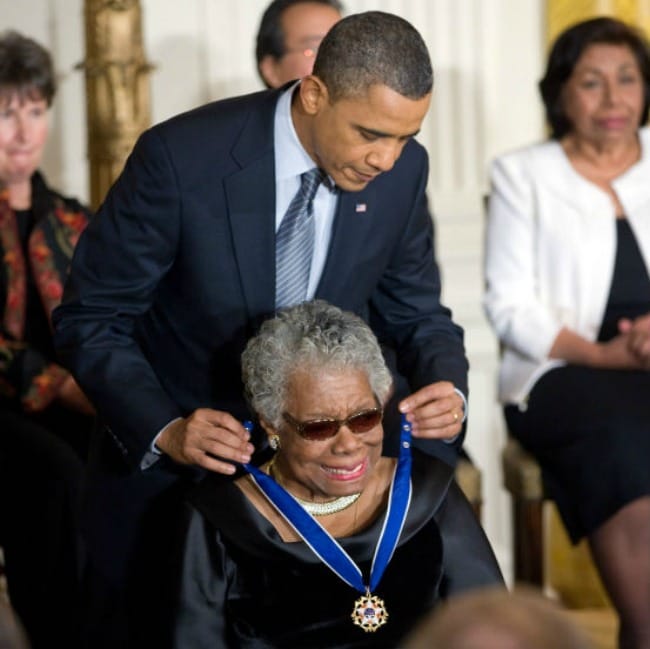

Uh oh...
It appears that you're using a severely outdated version of Safari on Windows. Many features won't work correctly, and functionality can't be guaranteed. Please try viewing this website in Edge, Mozilla, Chrome, or another modern browser. Sorry for any inconvenience this may have caused!
Read More about this safari issue.

March is Women’s History Month, and this second post will look at two more Arkansas women who deeply impacted our state – Hattie Caraway & Maya Angelou.
Hattie Wyatt Caraway

Hattie Caraway became the first woman elected to serve in the U.S. Senate in 1932, but her role in politics began long before that year. Hattie was born in Tennessee in 1878. She earned a Bachelor of Arts degree from Dickson Normal College in Tennessee in 1896. She also met her future husband while in college, Thaddeus Caraway, of Clay County, Arkansas. When Hattie and Thaddeus graduated, they headed for Arkansas, where they both taught in rural schools for several years.
The couple married in 1902 and Thaddeus pursued a law career, eventually settling the family in Jonesboro. While Hattie raised three sons, she also took an active role in her husband’s rising political influence. Thaddeus Caraway quickly flew through the ranks of the Arkansas government and became a U.S. senator in 1920. Hattie worked alongside her husband during his campaigns.
When Thaddeus died suddenly in 1931, Hattie was appointed to fill his seat until a special election could be called. It was common practice to allow the widow or daughter of an elected official to preside in office until an election could be held. Hattie beat two independent candidates in 1932, winning the right to stay in office the rest of her husband’s term in the Senate.
Most people assumed she would step aside when the Senate election rolled around in 1933. The field of Democratic candidates was strong and included Congressman John. L. McClellan. Using her influence with Louisiana Senator Huey Long, and her honest and personal connection with Arkansas voters, especially women, Caraway defeated the other Democrats and then easily won the election against her Republican opponent. Hattie Caraway was no longer the poor widow of Senator Thaddeus Caraway – she was a U.S. Senator in her own right.

Throughout her 14 years in the Senate, Hattie spoke on the Senate floor only 15 times. She believed in few words, but she revealed her passion for Arkansas in her actions for the state. She served on the Agriculture Committee, knowing that Arkansas would be most affected by decisions on farming, navigation and flood control. She supported President Roosevelt’s New Deal policies, and became the first woman to chair a Senate committee, preside over a Senate meeting, and run a Senate hearing.
Despite her dedication to the state, Caraway lost the 1944 election to Democratic challenger J. William Fulbright. After leaving the Senate, she continued to serve at posts for President Roosevelt and President Harry Truman. Hattie Caraway was still serving in this capacity when she died in 1950.
At a time when the representation of women in the Senate was non-existent, Hattie Caraway won the favor of Arkansas and represented both the state and women for many years.
Hattie Caraway’s grave can be found in Oaklawn Cemetery in Jonesboro, where it is listed on the National Register of Historic Places.
Maya Angelou

Maya Angelou lived in many places during her life, but Stamps, Arkansas was the location of her formative years and early education, and Arkansas left an indelible mark on one of the nation’s most famous authors, poets and speakers.
Maya was born Marguerite Annie Johnson in 1928 and lived in St. Louis until the age of four, when her father sent her and her older brother to live with their grandmother in Stamps. Maya’s grandmother owned a general store in Stamps and was able to provide for her grandchildren during some of the toughest years of the Great Depression.
When Maya was eight, she went back to her mother in St. Louis, where she underwent one of the most traumatizing and pivotal experiences in her life. Her mother’s boyfriend raped her, and though he was arrested, he was set free from jail, only to be killed four days later. Maya stopped talking for five years after this experience and soon she returned to Stamps. During these five years, Maya spent her time reading broadly, encouraged by a local teacher and mentor. She also experienced racism, and both of these experiences greatly impacted who Maya would become.
Maya left Arkansas to reunite with her mother in California, where she also studied dance, drama and music. Despite her literary successes in later years, she spent her first years after high school graduation pursuing a career in music and dance. She also had one son and held down many jobs, including waitress, dancer, cook and singer. She began to meet other performers in the African-American community who influenced her work and life. Maya Angelou helped organize a fundraiser for the Southern Christian Leadership Conference, the African-American civil rights group formed in part by Martin Luther King, Jr. After the fundraiser, King asked Angelou to become the northern coordinator for the group.
In pursuit of her career and a love interest, Angelou moved to Cairo, and then to Ghana. She also toured Europe as a member of an opera, and began learning a series of languages. While in Africa, she worked as a newspaper editor and a freelance writer, as well as in radio. She also met Malcolm X. It wasn’t until 1968, after the assassination of Martin Luther King, Jr. and moving back to New York, that Angelou penned her first memoir, I Know Why the Caged Bird Sings. Published in 1969, the book starkly portrays Angelou’s childhood years spent in Stamps, struggling with her identity, racism, and the sexual abuse and subsequent years of silence she endured. The book launched her writing career and established her link as an Arkansas author.
From this point in her career, Angelou became a prolific writer, poet and speaker. She followed up her first memoir with six more, publishing her last one in 2013. Her resonant voice and stage presence made her a coveted public speaker. She read the poem “On the Pulse of Morning” at the inauguration of President Bill Clinton in 1993. A recording of that poem won a Grammy Award. Angelou also wrote and directed a film and acted in several others, including her performance as Kunta Kinte’s grandmother in Roots.

Among the numerous awards and accolades Angelou received are the National Medal of Arts in 2000, the Presidential Medal of Freedom in 2011 and the Literarian Award by the National Book Foundation in 2013. When Maya Angelou died in 2014, she was still active as a speaker and writer. She left behind a deep collection of written, spoken and visual work.
Stamps, Arkansas renamed their city park in honor of Maya Angelou and the role Arkansas played in her life and career.
Photos: Maya Angelou By Adria Richards [CC BY-SA 2.0 (http://creativecommons.org/licenses/by-sa/2.0)], via Wikimedia Commons.
Stamps, Arkansas By Internet Archive Book Images [CC BY-SA 2.0 (http://creativecommons.org/licenses/by-sa/2.0)], via Wikimedia Commons
Join the Conversation
Leave a Comment
2 responses to “Women in Arkansas History – Hattie Caraway & Maya Angelou”
 Leave a Reply
Leave a Reply
We do the work.
You check your email.
Sign up for our weekly e-news.
Get stories sent straight to your inbox!









 Leave a Reply
Leave a Reply
[…] Hattie Caraway’s husband died, leaving an open senate seat, Governor Harvey Parnell appointed her to serve out his […]
[…] Hattie Caraway was born in Tennessee in 1878 and came to Arkansas after her marriage to Thaddeus Caraway. They settled in Jonesboro to raise a family. Thaddeus served in the U.S. House of Representatives and then became senator for the state of Arkansas in 1921. He died in office in 1931 and the Arkansas Governor appointed Hattie to finish his term, as was customary. In 1932, Caraway first won a special election, then announced she would run for the full term. She was the first woman to win an election and serve as a U.S. senator. She was reelected in 1938, serving two terms as a senator. […]